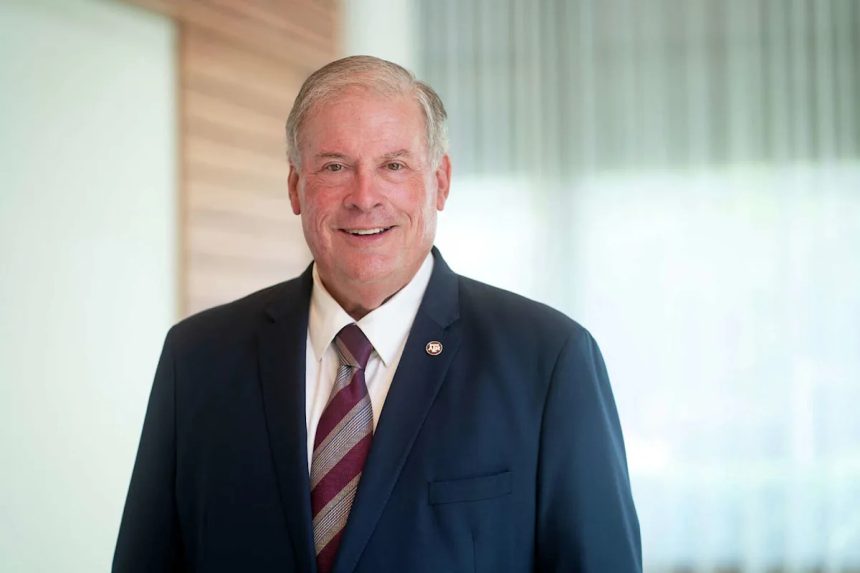Former state lawmaker Tommy Williams says he’s in listening mode as he begins his new role as interim president of Texas A&M University, as the flagship campus tries to move on from national controversy over gender-identity discussion and many faculty members remain concerned about the future of academic freedom on campus.
Don’t expect Williams to make any immediate moves, however, at the helm of the 79,000-student university, the largest in the state.
Williams shared his approach to his new role in a 30-minute interview Tuesday with the Houston Chronicle. Here are some takeaways from the conversation.
Read more: Everything we know about the fallout from a viral video at Texas A&M
He says he doesn’t want the permanent position
When the Texas A&M University System announced Williams as interim president on Oct. 3, Board of Regents Chairman Robert L. Albritton said that he felt Williams was the right person to steer the ship while the regents take the time needed to find a permanent leader.
Williams confirmed that he accepted the job on his own condition that it would pass to someone else.
“The regents will find that right person with the academic credentials and the disposition and the track record running a big organization over a long time,” Williams said. “I’m not building my resume. I’m almost 69 years old, and so I’m not interested in it. I think it’s a great job, but that’s not what I want to do.”
COLLEGE STATION: Aggies worry for the future as A&M searches for third permanent president in four years
Chancellor Glenn Hegar has named a committee to lead a national search. Representatives come from across the flagship, including several regents, the Corps of Cadets commandant, a former university president, a dean, an alumni group representative, the athletics director, staff council chair, student body president and two faculty members who have vocally supported academic freedom.
Williams’ intention to pass on the permanent job could reassure critics who fear his ties to the Texas Legislature would spur more political interference in higher education.
He is the latest Texas higher education leader picked after a career as an elected Republican. Williams spent six years as a state representative and 10 years as state senator, stretching from 1997 to 2013.
The board’s selection of Williams has also concerned some who feel university presidents should have traditional academic backgrounds. Higher education is moving away from its tradition of choosing leaders who are lifelong teachers, researchers or administrators with top academic credentials.
Williams graduated from Texas A&M University in 1978 with a bachelor’s degree in business administration in accounting. He does not hold a higher degree and has not taught at a college or university.
He said he expects the system to find a permanent leader by the start of the 2026-2027 academic year, though he’ll remain in position as long as it takes.
“I don’t have the disposition or educational background to do this over the long term,” Williams said. “I hope that (the regents will) make a selection for someone that can be here for a very long time.”
He says he got the call a week before Mark Welsh resigned
Williams said he received a text from Hegar on Friday, Sept. 12, as he sipped coffee and watched the sun rise from the deck of his farm in Navasota.
When they got on a call, Williams said he first thought the A&M chancellor was using him as a sounding board. Then Hegar told Williams that he wanted him to be the interim president of Texas A&M.
“I got called off the bench,” he said.
University President Mark A. Welsh III resigned a week later on Sept. 19, as he faced mounting public and political pressure over his response to a professor’s teaching about gender identity in a summer children’s literature course. A hidden camera video had captured a student challenging the instructor, leading to a firestorm on social media.
Hegar and the regents had stayed relatively quiet while some lawmakers pushed for Welsh’s resignation, and Lt. Gov. Dan Patrick escalated pressure on the retired four-star general, who initially sided with the professor and later removed two university administrators.
System spokesman Chris Bryan said it would not surprise him if Williams was one of Hegar’s many calls made in the days after the video’s release.
“The chancellor was preparing for a lot of different possibilities,” he said.
Williams demurred when asked to confirm the timeline of events.
“I don’t know the exact time, but (Hegar) wanted me to consider that,” he said. “I talked to my wife, and she agreed to go along with it. And so that was sort of the way it got kicked off.”
Williams also said he considers Welsh to be a friend, and that he believes the leader left the university in good shape.
He has met with dozens of Aggies
Since the regents voted him in, Williams said he has attended the groundbreaking of the new Aplin Center – named after Buc-ee’s CEO – for hospitality and food development programs, a distinguished alumni banquet and interviews with two candidates for the next vice president of research. He also participated in the Silver Taps ceremony honoring deceased students and celebrated the Aggies winning two football games.
Williams’ first official day on the job came with several meetings last Monday, including with prominent donor and alumni groups. The meetings included: the medical school dean, his executive committee, the A&M Foundation, the Association of Former Students and the 12th Man Foundation.
On day two, Williams sat with his cabinet, the chancellor, the athletics director and the Corps commandant. His listening tour has continued with the provost’s office, the strategic budget council, faculty chairs, the Corps of Cadets Association and leaders of the George and Barbara Bush Foundation on Wednesday.
He also received a crash course on the academic course review process and met with deans, distinguished professors and student government leaders at the end of the week. He said he had lunch on Monday with the Sul Ross Group, which represents older alumni.
“I’ve been busy and listening to people, and we’re not done yet,” Williams said.
He sees himself as ‘a cleanup guy’
Williams worked in the accounting industry before running a financial services practice, which he later sold to Woodforest National Bank, he said.
More Texans might know Williams from his 16 years in the Legislature. He also spent four years as vice chancellor for federal and state relations at the Texas A&M System after then-Chancellor John Sharp recruited him to the job in the middle of his four-year term in the Texas Senate.
A&M SYSTEM: Hegar on culture wars, a new era of state-driven reforms in higher ed
Williams then served as Gov. Greg Abbott’s senior adviser for fiscal matters when the Legislature met in 2019. His work largely focused on public education reform, including teacher pay raises, he said. He also led changes to Texas Health and Human Services Commission’s contract procurement process.
“I guess I was a little bit of a cleanup guy for (Abbott),” he said. “I know how to get the shiny side up on a big organization, figure out what we’ve got to do, and I think I can do that (at A&M).”
After retiring from the state in December 2019, Williams started a consulting and lobbying practice. He said he has since turned it over to two associates and hopes to return to the practice after he finishes as interim president.
Williams’ registration as a lobbyist was terminated on Oct. 2, according to paperwork filed with the Texas Ethics Commission.
He says he values academic freedom and ‘academic responsibility’
Williams arrives at A&M as Texas’ four-year institutions are increasingly regulated by state and national Republican leaders. Some of those moves stem from lawmakers’ desire to root out what they see as liberal bias on campus and to boost students’ return on investment.
Many faculty have decried the changes as stripping open inquiry and eroding the democratic process of academic freedom.
Such conversations became heightened at Texas A&M under Welsh’s predecessor. When Welsh took office, he sought to repair fractured relationships with faculty and launched a task force to ensure instructors would retain their voices on campus.
Williams said he believes that academic freedom is “very important” but goes hand-in-hand with “academic responsibility” – which he described as faculty being responsible with the content in their courses. He did not share what he’s gleaned from his conversations across campus, however.
“I’m interested in moving the school forward,” he said. “I’ve heard from the faculty, and I’ve heard from the students, and there are concerns that are out there. I’m confident they’re all things that can be addressed and that they will be addressed sooner rather than later. But I think it’s important that I hear from everyone, because I don’t want to presume that I’ve already figured it out.”
Megan Lacy, A&M’s vice president for strategic initiatives, said Williams has not paused any projects started by his predecessor Welsh, and he has “expressed the importance of continuing important work underway.”
Students, legislative knowledge will be important
Williams said his legislative experience has already been helpful in his new role, but what he’s enjoyed most so far has been talking with A&M students and other stakeholders on campus.
The former lawmaker is a lifelong Aggie. He grew up attending games with his father, who played football at the university, and he said he didn’t want to attend school anywhere else.
Williams has been married to his wife, Marsha, for 43 years. They have two sons and seven grandchildren.
Clarification at 10:11 p.m. on Oct. 16, 2025: This story has been updated to reflect that Tommy Williams’ lobbyist registration was officially terminated on Oct. 2.
This article originally published at ‘A cleanup guy’: Tommy Williams starts listening tour as Texas A&M interim president.









